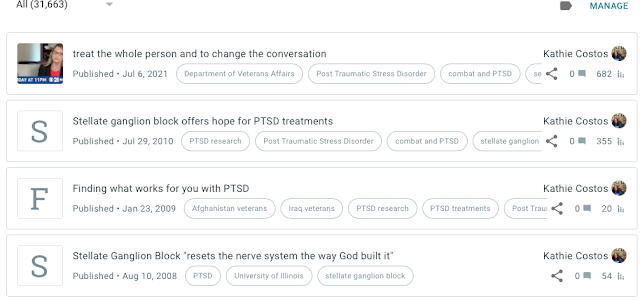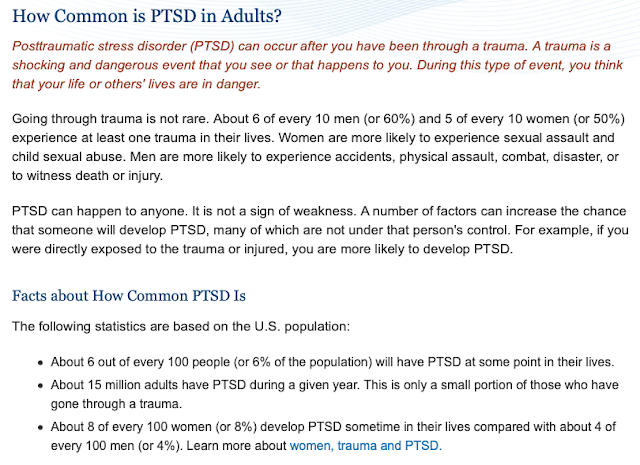Over the years there have been a lot of "treatments" people have regarded as the miracle we've all been waiting for to treat Post Traumatic Stress Disorder. There have been drugs used to treat Epilepsy as anti-convulsion. Ecstasy and marijuana have been used in trials. Rapid eye movement, re-exposure and the list goes on. When I meet people some of these treatments have worked on, they try to sell it as the cure for all, but there is no such thing. While some of these things work for them, which is wonderful, it may not work at all on someone else.
The key here is patience. Understanding that your body chemistry is not the same as your best friend's leads to knowing why he's doing better and you're not. Humans are unique. While no one looks the same as you do, no one heals the same way you do. You may have been wounded the same way but your mind, your body and your soul are as different as they come.
First piece of advice when you're being treated for PTSD is talk to your doctor. You need to be totally honest and open about what you are experiencing. If medication is not working or you're having side affects, tell them so they can change the medication. They may have to change the dose or find something else or combine it with another medication.
If they tell you to go into group therapy and you don't feel as if you can talk in front of a bunch of strangers, try it. If it does not help after a few times, tell your doctor. It's not a failure if you can't do it. It just means you need more one on one in private until you are ready for group. People have a hard time trusting others even when they do not have PTSD, but PTSD adds in the paranoia factor making it virtually impossible to trust strangers. It's also one of the biggest reasons many veterans have temporary set backs when their doctors change. The trust between you and your doctor didn't happen over night but often they are transferred or in some cases, they are deployed, leaving you with someone totally new asking you the same questions you addressed with your original doctor.
Trusting your doctor, liking them, is very important. If you don't trust them, tell the VA to find you another doctor. They cannot help you if you are unable to open up without hesitation. Ask them questions. As they get to know you, make sure you get to know them as well. Give them a chance.
If you hear about a treatment that holds some promise for you, talk to your doctor about it. If they have not heard of it, ask them to check it out and tell you what they think.
Make sure as you address the medical treatments, you are also addressing the other parts of you needing healing. Talk to a spiritual leader of your own faith or find one you are comfortable with. There are many other things you can do to take care of your spirit from yoga, to meditation, to martial arts, taking a walk, listening to relaxing music. There are also combinations of all of the above but again, it depends on what works best for you. Keep trying until you find something that helps you.
Eat properly. With depression comes poor eating habits. Try to keep a well balanced diet.
DO NOT DRINK! Alcohol, especially when you're on medication does more harm than good. Talk to a PTSD veteran healing and you'll find they gave up drinking and self-medicating. The combination of alcohol and medications will depress you even more than you already were.
Remember that above all of this, no treatment works for everyone. Once you know what PTSD is, you're able to find some patience with yourself and the other people in your life as well. Try to get them to understand what's going on with you. Most of the time they love you and are more than willing to help you. When they know what PTSD is, it avoids a lot of problems that can do you more harm than good. Their reaction to you depends on what they understand and are aware of.
Don't fight this alone thinking that you'll just get over it and get back to "normal" once you're home. There is nothing normal about combat. It's not part of a normal daily life and each experience humans have change them for better or worse. It's what you do with the changes that determines your future.
You can find your own kind of normal that works for you and your family. The person you were before PTSD is still in there but it's trapped behind a wall of pain. Once the wall begins to come down after reaching out for help, you will find a flood of emotions coming out. Often veterans cry as the pain is released from inside of them. They fear they are getting worse but I can assure you that the healing has begun. PTSD trapped it all and help opens what has been bottled up. Crying is not a setback or a sign of weakness. It's simply a sign of "humanness"
Fighting the war within
Thursday, January 22, 2009 11:08 PM
By Sylvia Perez and Christine Tressel
January 22, 2009 (WLS) -- Post traumatic stress disorder is a psychological health crisis usually associated with veterans. But it can be triggered by any traumatic event such as a car accident or physical assault.
Some people don't get better with conventional treatments.
Now, an area doctor says an injection commonly used to control pain, can also help a traumatized brain.
The sights and sounds of war. For some veterans the images and feelings don't go away.
"A lot of dead bodies, the destruction. Telling people to do things that could get them killed. That weighs a lot on my mind," said Shane Wheeler, veteran.
After two separate tours in Afghanistan and Iraq, 35-year-old Shane Wheeler made it home with no physical wounds. He thought he left the war behind but the memories of what he experienced in combat wouldn't go away.
"Seeing a few of my friends died in front of me," said Wheeler. "I think that put me over the edge."
Shane now suffers from post traumatic stress disorder or PTSD. Symptoms vary but for many it involves re-living traumatic episodes. Researchers believe part of the brain becomes stuck in an overactive state.
And that's why Shane has traveled from Radford , Virginia to Hoffman Estates. He's hoping an experimental procedure involving an injection in his neck will work. It's called a stellate ganglion block.
"It's to reset the area of the brain that has become abnormal where they have this heightened sense of excitement," said Dr. Jay Joshi, anesthesiologist, Advanced Pain Centers.
Dr. Eugene Lipov and his team have been doing this procedure for years to treat severe hot flashes. And now they say it appears to work on PTSD patients.
Shane is the second veteran to give it a try. click link for more



